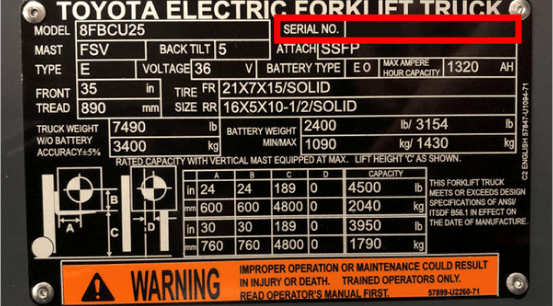How to Find Your Equipment Model Number.
Finding the right parts for your equipment is easy when you have your model and serial number which can be found on the data plate. Luckily, a forklift data plate is installed on every truck on the market to help you understand what your forklift can do and provide vital information.
Model Number: The model number of your toyota forklift is extremely important for relaying information to your dealers about repair or technical assistance and for looking up replacements part!
Serial Number: The serial number on your lift is the most important number.The model serial number combination will allow us to provide you with the parts that will fit your particular piece of equipment.

How to Find Your Equipment Serial Number
Finding the right parts for your equipment is easy when you have your model and serial number which can be found on the data plate. Luckily, a forklift data plate is installed on every truck on the market to help you understand what your forklift can do and provide vital information.
Model Number: The model number of your toyota forklift is extremely important for relaying information to your dealers about repair or technical assistance and for looking up replacements part!
Serial Number: The serial number on your lift is the most important number.The model serial number combination will allow us to provide you with the parts that will fit your particular piece of equipment.

Need some help? For further assistance or more information, contact your local Toyota Dealer.

Please click below to sign in to your MyToyota account
Don't have an account?

Where would you like to go?
Exploring Internal Combustion Fuel Options

What to Consider for Internal Combustion Forklifts?
Selecting an internal combustion forklift option can be a great way to combine power and efficiency for clear ROI. But even after you’ve made the decision between electric and IC forklift solutions, your energy decision isn’t over. In fact, you still have a wide variety of options that can be selected to build the correct material handling equipment that’s right for your unique application. Below, we explore internal combustion fuel options at a high level, to help guide your decision-making process.
Internal Combustion Forklift Fuels
Liquid Petroleum Gas (LP) – LP is ideal for customer locations that do not have gasoline, diesel, or CNG refilling stations readily available. If you’re purchasing forklifts for a new facility, LP has the lowest initial cost since you only need to purchase LP tanks and find a place to store them.
Diesel – Diesel fuel is highly efficient and can offer longer run times in general compared to other fuel types, while also providing increased acceleration over their internal combustion counterparts.
Gasoline – Gasoline powered forklifts are rare due to the popularity of dual fuel units. However, for customers that have refueling stations readily available that can accommodate their fleet size, there is little reason to use LP or dual-fuel configurations. They are also typically more powerful than their diesel alternatives and can provide increased travel and lift/lower speeds.
For more information or assistance assessing forklift charging methods, contact your local, authorized Toyota dealer today!